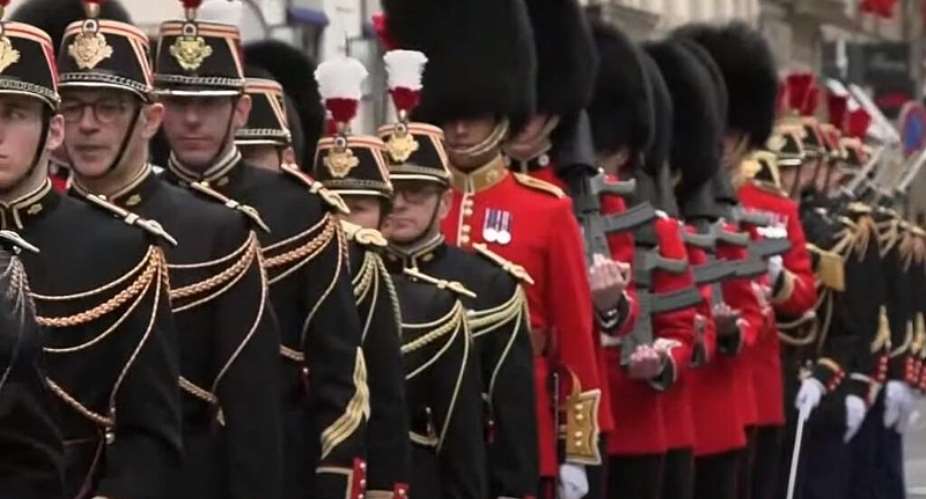French and British troops on Monday swapped roles and took part in an unprecedented changing of the guards ceremonies outside the palaces of each other's head of state to celebrate 120 years since the Entente Cordiale.
What was the Entente Cordiale?
The Entente Cordiale was a diplomatic agreement signed between the United Kingdom and France in 1904. It marked the end of centuries of intermittent conflict and competition between the two nations, particularly in colonial territories.
The agreement resolved various colonial disputes between France and Britain, mainly in Africa. It also paved the way for closer diplomatic and military cooperation between the two countries.
Although it was not a formal alliance, the Entente Cordiale was a significant step towards the alignment of British and French interests, particularly in the face of rising tensions in Europe leading up to World War I.
The agreement was driven largely by growing militarism across Europe, which saw Germany pushing to develop its armed land forces and maritime forces.
In 1900, Germany issued a new Navy Law, part of which envisaged the construction of 19 new battleships and 23 cruisers over the following 20 years.
The UK, until then the world's dominant maritime power, felt threatened by the move and went looking for friends.
Historian Barbara Tuchman, writing in her chronicle of that time The Proud Tower, says that Edward VII, the new king of England, in response "prepared the ground for reconciliation with France" and visited Paris "with tact and aplomb."
The result was theEntente Cordiale, or the "Agreement between Great Britain and France". It was signed on 8 April 1904.
'Forgetting old quarrels'
In the text, Paris and London agree to forget "old quarrels [with a view] to establishing a new friendship and fundamentally defining the balance of Europe."
The text gave the French fishing rights in formerly disputed areas near Newfoundland, fixed boundaries between French and British colonies in Niger and Chad, Siam (Thailand) and solved disputes regarding Zanzibar, Madagascar and the New Hebrides.
The Franco-British alliance was preceded by a rapprochement between France and Russia, signed in 1892, when Paris and Moscow agreed to form a military pact in the face of growing German militarism.
When the Bosnian Serb Gavrilo Princip murdered Austro-Hungarian Arch-Duke Franz Ferdinand on 28 April 1914, Vienna declared war on Serbia.
When Russia, Serbia's traditional ally, started mobilising along the Austrian and Hungarian border and did not react to a German ultimatum to stand down, Berlin mobilized and declared war on Russia. It demanded, but did not get a guarantee of French neutrality. Its invasion of Belgium triggered Britain's entry into the war followed by France as its ally in the Entente.
'Close friendship'
The Entente Cordiale lasted through two world wars and continues today.
Before celebrating the 120th anniversary of the treaty, British Foreign Minister David Cameron and his French counterpart, Stéphane Séjourné, celebrated what they described as their close friendship in a joint op-ed published on Sunday in the British newspaper The Telegraph.
Talking about NATO and its increased involvement in the war in Ukraine, they wrote: "Britain and France, two founding members and Europe's nuclear powers, have a responsibility in driving the alliance to deal with the challenges before it.
"We must do even more to ensure we defeat Russia. The world is watching – and will judge us if we fail."
During the ceremonies, British guards took part in the changing of the guard outside the Elyéee Palace of President Emmanuel Macron, who watched together with Menna Rawlings, the British Ambassador to France.
"This is the first time in the history of the Elysée that foreign troops have been invited to participate in this military ritual," a French presidential official said.
Meanwhile, French guards did the same outside Buckingham Palace in London, watched by the Duke and Duchess of Edinburgh, Prince Edward and his wife Sophie. The UK 's chief of the general staff, General Patrick Sanders, and the French chief of the army staff Pierre Schill were also in attendance.
The event on the forecourt of Buckingham Palace marked the first time a country from outside the Commonwealth has taken part in the changing of the guard.
At the end of 2023, Macron made the changing of the Republican Guard public again, on the first Tuesday of each month, though the ceremony is much less spectacular than its counterpart outside Buckingham Palace.





 Western North been sidelined for far too long; address our needs before 2024 ele...
Western North been sidelined for far too long; address our needs before 2024 ele...
 Effutu: 'Stop eating at night and take care of your health' — Afenyo Markin advi...
Effutu: 'Stop eating at night and take care of your health' — Afenyo Markin advi...
 Akufo-Addo's desperate attempt to disrupt Yagbonwura's 1st year anniversary cele...
Akufo-Addo's desperate attempt to disrupt Yagbonwura's 1st year anniversary cele...
 Armed robbers attack, rob Sethi Brothers Ghana Limited in Tema
Armed robbers attack, rob Sethi Brothers Ghana Limited in Tema
 SML deal: We commend Manasseh for holding gov't to account, Akufo-Addo for not s...
SML deal: We commend Manasseh for holding gov't to account, Akufo-Addo for not s...
 Our recall invocation is in good faith to consider three key issues – Majority
Our recall invocation is in good faith to consider three key issues – Majority
 You’re inviting bad luck upon yourself if you use Indian hair — Spiritualist war...
You’re inviting bad luck upon yourself if you use Indian hair — Spiritualist war...
 Ejisu by-election: Police questions Kwadaso MP, two others over bribery allegati...
Ejisu by-election: Police questions Kwadaso MP, two others over bribery allegati...
 Nana Kwame Bediako is Nkrumah’s reincarnate; he’ll be president if he appoints N...
Nana Kwame Bediako is Nkrumah’s reincarnate; he’ll be president if he appoints N...
 Dumsor: Mahama gave us ‘dum, dum, dum’ but we are now in the era of ‘dum sie sie...
Dumsor: Mahama gave us ‘dum, dum, dum’ but we are now in the era of ‘dum sie sie...
